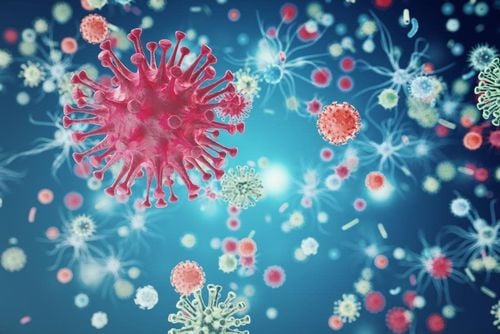This is an automatically translated article.
The article was written by Specialist Doctor I Le Thi Nha Hien - Internal Oncologist, Department of Medical Examination & Internal Medicine - Vinmec Nha Trang International General Hospital.Bacteria are very small living organisms made up of only one cell. Most bacteria are not harmful, but some can infect people and cause illness. Some have even been linked to cancer.
1.Helicobacter pylori Stomach cancer is more common worldwide. A stomach infection with Helicobacter pylori (H pylori) bacteria for a long time can cause ulcers. It can also inflame and damage the lining of the stomach. Some of these changes can lead to cancer over time, especially cancer in the lower part of the stomach. In addition, H pylori infection has also been associated with some types of gastric lymphoma.
While infection with H pylori bacteria can cause stomach cancer, most people who have this bacteria in their stomach never get stomach cancer. There is also some evidence that people with H pylori may have a lower risk of certain other types of cancer, although exactly what role bacteria play in this is unclear.
About two-thirds of adults worldwide are infected with H pylori bacteria. Infection rates are higher in developing countries and in older age groups. It can be spread in a number of ways. One is the fecal-oral route, such as through contaminated food or water. It can also be passed from person to person, from mouth to mouth
Other factors also play a role in whether someone develops stomach cancer. For example, nitrites are commonly found in processed meats, some drinks, and some vegetables. They can be converted by some bacteria, such as H pylori, into compounds that have been found to cause stomach cancer in laboratory animals.
Antibiotics and other medicines may be used to treat H pylori infection. According to the CDC, people with active sores or a history of ulcers should be tested for H pylori, and if they are infected, should be treated. Testing and treatment for an H pylori infection is also recommended after early gastric cancer is removed.

2. Chlamydia trachomatis Chlamydia trachomatis is a very common bacteria that can infect the female reproductive system as well as other parts of the body in both men and women. It is spread sexually.
Although reproductive tract infections can cause symptoms in some people, most women have no symptoms. This means that women infected with Chlamydia often do not know they are infected unless a sample is taken during a pelvic exam and is tested for Chlamydia . It is an infection that is common among young sexually active women and can persist for years unless detected and treated.
Some studies have found that women with blood test results showing past or current chlamydia infection may have a higher risk of cervical cancer than women with test results. negative blood.
Vinmec International General Hospital offers a Package of Examination and Screening for social diseases to help customers detect diseases early and have effective treatment and prevent dangerous complications. The screening package for social diseases at Vinmec is for all ages, both men and women.
When registering for the Social Disease Screening Package, customers will receive: Dermatology specialist examination; Perform tests such as: HIV Ab rapid test, Chlamydia rapid test, Treponema pallidium rapid test, qualitative and quantitative Treponema pallidum TPHA test, bacteriological smear test and staining fungal test soi...
Please dial HOTLINE for more information or register for an appointment HERE. Download MyVinmec app to make appointments faster and to manage your bookings easily.
Studies have not shown that Chlamydia itself causes cancer, but it may work with HPV in a way that promotes cancer growth. For example, researchers have found that women who have had chlamydia along with HPV are more likely to still have HPV when they get tested again later than women who don't have chlamydia. Although more studies are needed to confirm these findings, there are good reasons to be tested for Chlamydia infection and treated with antibiotics if detected.
In women, long-term Chlamydia infection is known to cause pelvic inflammatory disease that can lead to infertility, mainly due to the formation of scar tissue in the fallopian tubes. Like other infections that inflame or ulcerate the genital area, chlamydia can also increase your risk of getting HIV from exposure to an HIV-infected partner.














